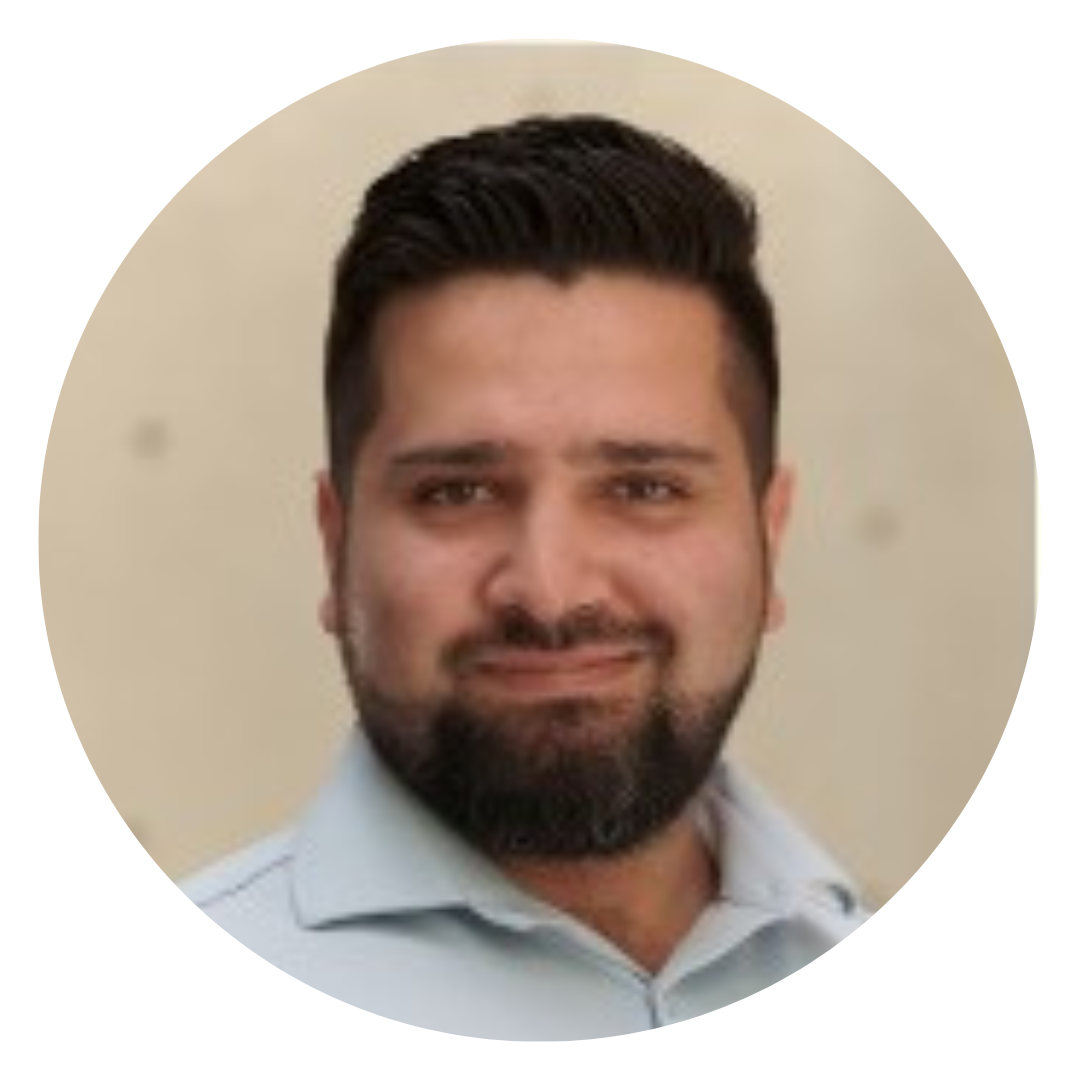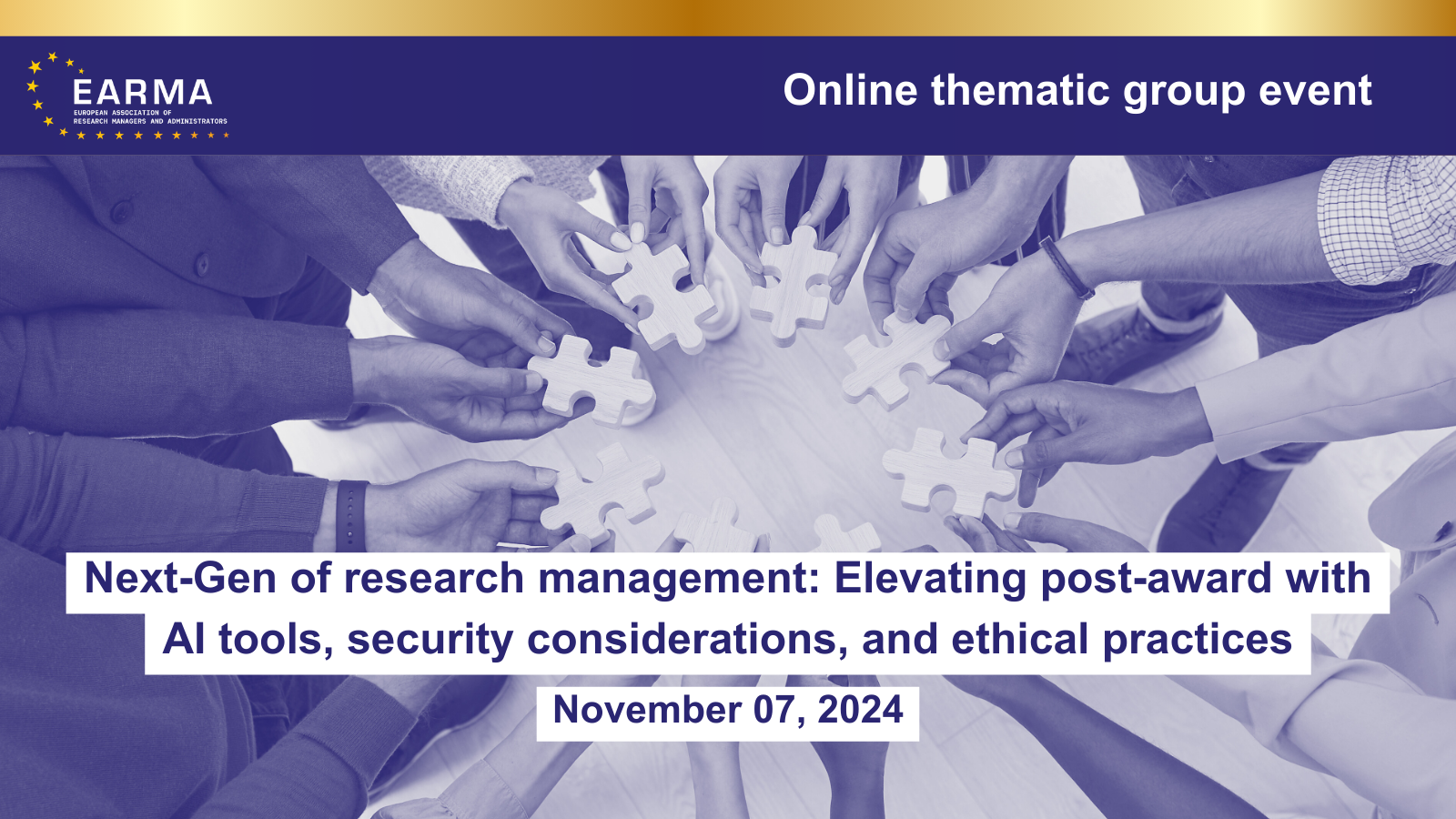Event date: November 7, 2024
Event time: 10:00 - 13:00 CET
Location: Online to be accessed via the EARMA website
Registration and access
This event is free of charge, but as for all our events, registration is required.
On the day of the event see here how to access the event.
About the event
The content of the event is organised by the Post-Award Project Management EARMA Thematic Group (PAPM).
In the rapidly evolving landscape of research management, leveraging cutting-edge technologies has become imperative for success. The "Next-gen research management: Elevating post-award with AI tools, security considerations, and ethical practices" webinar is dedicated to exploring how artificial intelligence (AI) can improve post-award project management. This webinar will feature three sessions from leading project managers, showcasing AI tools, discussing research security considerations and ethical practices.
-
The first session, "leveraging AI tools for research management", will provide insights into how existing AI applications can help streamline administrative processes, optimise resource allocation, and improve reporting accuracy.
-
- The second session, a round table discussion around "research security", will address critical aspects of safeguarding sensitive data and ensuring compliance with regulatory standards, highlighting best practices for maintaining robust security protocols in an AI-driven environment.
-
- The final session, "ethical misconduct" will provide a case study delving into real-world scenarios of ethical challenges in research, offering strategies to maintain transparency, accountability, and integrity.
Attendees will gain practical knowledge and actionable strategies for implementing AI solutions in their projects. This webinar offers a unique opportunity to share experiences with peers and discover innovative approaches that can transform post-award management.
Join us to stay at the forefront of research management, harnessing the power of AI while upholding the highest standards of security and ethics.
Agenda
The event includes three sessions, each with its timing listed below. Attendees can plan to join or leave the sessions according to the timetable. The link for joining will be the same for all sessions.
All times shown below are displayed in Central European Time (CET).
|
10:00 - 10:05
|
Topic: Intro to the session theme
|
|
10:05 - 11:00
|
Showcase 1: Use of artificial intelligence tools for project management
Speaker 1: David Brena, Leveraging Al tools for Research Management
|
|
11:05 - 12:00
|
Showcase 2: Research security
Speaker 2: David Leslie
|
|
12:05 - 12:45
|
Showcase 3: Ethical misconduct - case study
Speaker 3: Lisa Eckford-Soper
|
|
12:45 - 13:00
|
Topic: Conclusion to the session theme
Wrap-up, closing remarks, presentation of the 2025
|
Session moderators will be Mira Lindner, Pauline Rasera, and Jake Reardon.
Speakers

David Brena obtained a BASc in Biotechnology engineering from Tecnológico de Monterrey, México and worked in a molecular pathology spin-off company from Hospital Ángeles, Puebla, México before deciding to move to Barcelona to pursue an MSc and PhD in Biomedicine, both from the University of Barcelona, trained in Cerón lab at IDIBELL. He is a scientist by training and passion, and a science communication enthusiast looking for new ways of supporting research and researchers. His scientific background is in modeling human diseases in C. elegans, in vivo optimization of CRISPR-Cas systems, and cancer epigenetics. On the personal side, David is a film buff and guitar and voice of an indie rock local band. David works now as a Scientific Project Manager at the Strategy and Funding (SaF) team at the Centre for Genomic Regulation (CRG), where he writes and implements MSCA and other internationally coordinated initiatives. In the SaF team, we constantly look for ways to improve our processes with the use of technology, and the wave of GenAI has been a great focus in the last year.

David Leslie is the Director of Ethics and Responsible Innovation Research at The Alan Turing Institute and Professor of Ethics, Technology and Society at Queen Mary University of London. He previously taught at Princeton’s University Center for Human Values, Yale’s programme in Ethics, Politics and Economics and at Harvard’s Committee on Degrees in Social Studies, where he received over a dozen teaching awards including the 2014 Stanley Hoffman Prize for Teaching Excellence. David is the author of the UK Government’s official guidance on the responsible design and implementation of AI systems in the public sector, Understanding artificial intelligence ethics and safety (2019) and a principal co-author of Explaining decisions made with AI (2020), a co-badged guidance on AI explainability published by the UK’s Information Commissioner’s Office and The Alan Turing Institute. After serving as an elected member of the Bureau of the Council of Europe’s (CoE) Ad Hoc Committee on Artificial Intelligence (CAHAI) (2021-2022), he was appointed, in 2022, as a Specialist Advisor to the CoE’s Committee on AI where he has led the writing of the zero draft of its Human Rights, Democracy and the Rule of Law Impact Assessment for AI, which will accompany its forthcoming AI Convention. He also serves on UNESCO’s High-Level Expert Group steering the implementation of its Recommendation on the Ethics of Artificial Intelligence.

Lisa Eckford-Soper transitioned from an academic position to a project manager at the University of Southern Denmark in 2022. Originally from the UK, she holds an MSc in Marine Biodiversity and Biotechnology and a PhD in Marine Science. Lisa is dedicated to supporting researchers in the Faculty of Science, using her academic experience to help implement and execute their projects. With a personal interest in ethics and extensive learning experiences, she brings a wealth of firsthand experience in dealing with ethical issues in projects. She is now working with her team's lawyer, gathering relevant case studies, and putting together internal guidelines on ethics within the faculty.
Any queries?
Don't hesitate to email earma@earma.org.




